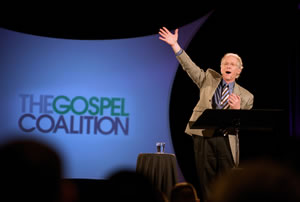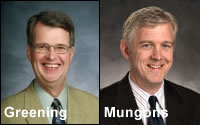Learning from the Gospel Coalition, Part 2
by John Greening and Kevin Mungons
Reprinted with permission from The Baptist Bulletin.
 Evaluations
Evaluations
We believe the Gospel Coalition movement bears watching. Because the movement itself is still developing and taking shape, our thoughts here should not be taken as a full analysis of this new movement. But having attended the conference and having enjoyed many aspects of it on a personal level, we would like to offer a few tentative observations.
We share an emphasis on quality expository preaching. To be honest, while we felt the overall quality of preaching here was superb, it was not vastly different than what we are accustomed to from preachers in our association. Granted, the Gospel Coalition speakers were “heavy hitters” who have traveled and written extensively. We are grateful for their ministry. However, our pastors are just as committed to consistently and faithfully opening the Bible to feed the flock (though many of them will never become famous). We are grateful that the speakers here have humbly expressed complete confidence in the power and authority of the Word of God—but we also believe this is a virtue our pastors have consistently displayed. We returned home from the conference with a new appreciation for our own preachers. We should encourage such preaching wherever it occurs.
We do not share an exclusively Reformed identity. At times we felt more like spectators than participants in the conference—there are a few obvious points of theological difference. Many of the leaders of the Gospel Coalition are Reformed pastors and theologians. While respecting Reformed teaching, we do not fully identify ourselves under that umbrella. We make this distinction for what we consider to be valid theological and hermeneutical reasons. The GARBC has sometimes been described as “moderately Calvinistic” in its soteriology, but we do not embrace covenant theology and its hermeneutics. Some of our pastors and leaders feel more strongly than others about the resurgence of Reformed thought among our young leaders. As we continue these discussions, we need to carefully articulate the affinity—and differences—we have with Reformed theology.
Every movement has its loose cannons. During a seminar on “Preaching to a Christianized Culture,” one of the Gospel Coalition speakers surprised us with a bit of fundamentalist bashing—an allegation that the GARBC is legalistic. After the workshop was over, our pastor tactfully reminded the speaker that many GARBC pastors were attending the conference, and that perhaps his charge of legalism was an inaccurate generalization.
One of the conference speakers was Mark Driscoll, pastor of Mars Hill Church in Seattle, who was a popular but controversial choice. We have watched from a distance as older leaders in conservative evangelicalism graciously but confrontationally admonish the younger men, especially when their patterns of speech do not conform to Scripture. Perhaps we will witness the process of a young pastor (who has been thrust into prominence) gradually maturing in the ministry.
We mention these incidents with charity. Our own movement has its loose cannons (and none of us is completely innocent when it comes to ill-advised words). All of us seek the best ways to nurture a younger brother or sister toward wise speech. May we all be willing to honor Driscoll’s preaching text, 2 Timothy 2:24, delivering public correction graciously when it is warranted.
The Gospel Coalition seeks to reform evangelicalism. Leaders in the Gospel Coalition seem to have launched a counter insurgency against the demise of solid Biblical preaching and practice in the evangelical community at large. Speakers at the conference made several references to the liberalism of the past, as if to head off a potential collapse of Biblical integrity if evangelical trends continue to their logical end. The Gospel Coalition has courageously called for an abandonment of trivial and worldly methods. They are beckoning a return to bold preaching from the authoritative Word, confronting people in their sin and communicating the reconciliation with God that comes only by the blood atonement and resurrection of Christ. In this regard, we commend their attempts at reform.
But having said this, we believe our pastors and churches should humbly emphasize that our own movement has always affirmed these “fundamental” beliefs. The sort of doctrinal and methodological housecleaning we see here was practiced by the GARBC in our earliest days. The problems in evangelicalism today are the bitter fruit of the “new” evangelicalism of the 1950s. We say this with no sense of I-told-you-so triumphalism. Rather, we humbly submit that the idea of ecclesiastical separation has protected our association from some theological and methodological problems that mark other groups. In this regard, the idea of fundamentalism was right. The adage is true, “An ounce of prevention is worth a pound of cure.” To be sure, our own movement continues to struggle over the limits and extent of this separation. So we, too, embrace the Gospel Coalition’s call to preach boldly and gently at a white-hot level.
While we may have personal fellowship, we cannot have organizational cooperation. The Gospel Coalition seems to be moving toward a more formal infrastructure. There is a governing council, a vision for regular meetings, a strategic plan for the future, a mechanism for local chapters, an approval system for prospective affiliates, a placement service, sponsored publications, and a church-planting network. In a recent Christianity Today article, Gospel Coalition cofounder Don Carson referred to these relationships as “almost a coalition of coalitions.” During the conference, Tim Keller called the interrelationship of organizations “a movement of movements.”
But leaders of the Gospel Coalition also acknowledge that some individuals may not participate in every aspect of their organization. In referring to their doctrinal statement as “a center-bounded set,” Don Carson has described the Gospel Coalition in terms of levels of agreement and levels of cooperation.
Carson’s idea could be helpful when exploring the limits of participation in cooperative events such as this. The idea of “levels of fellowship”—personal fellowship without organizational cooperation—has been articulated convincingly by fundamentalists such as Kevin Bauder, Myron Houghton, Rolland McCune, and Ernest Picker?ing, among others. While we may profit by our personal friendships with the broader evangelical community, our association would not have a formal alliance with theirs. The Gospel Coalition remains a broad-based evangelical organization bringing together some groups with which we would not partner in ministry. To do ministry together would require that one of us must choose to deemphasize particular doctrines that make us distinct. We prefer to not do that.
We must give attention to defining the gospel. The Gospel Coalition puts great emphasis on the centrality of the gospel to all of the Christian life and ministry. This idea was tightly integrated into the conference theme and preaching. It seems that the gospel to which they refer is not just the tenets of justification by faith, but the gospel, the cross, even the grace associated with the gospel that becomes the foundation for both justification and sanctification. This is a good and needed emphasis in ministry and preaching—corrective in many ways. By emphasizing the grace of God as the enabling force for transformation, the Gospel Coalition seems to be combating popular self-help and self-effort approaches to spiritual growth. We applaud this emphasis.
We must also give thoughtful attention to the possible misuse of these ideas. Dr. Bryan Augsburger suggests that a gospel-centered approach to homiletics is commendable, but could also become predictable or forced if careful interpretive guidelines are not applied. A less-careful pastor may attempt to wrestle the subject of Christ or the gospel into the natural flow of many preaching texts, especially the Old Testament.
“I agree that a gospel-centered approach is important,” says Dr. Augsburger, “but it is possible for this emphasis to become reductionistic.”
Here is where our conclusions become more tentative; analyzing a developing movement can be difficult. It seems the Gospel Coalition has developed a carefully-worded doctrinal statement, but remains somewhat undeveloped in implementation. Further, while it is heartening to see conservative evangelicals forsaking doctrinal ambiguity, it remains to be seen just how the participating organizations will cooperate. Or—how they will enforce their own doctrinal core.
Conclusion
We returned from the Gospel Coalition spiritually refreshed and challenged to continue to integrate the gospel into every aspect of our lives. But we also returned with a commitment to the idea of an association of independent Baptist churches. When it comes to organizational cooperation, we’ll stick with the GARBC! Now, one might expect the GARBC national representative and the editor of the Baptist Bulletin to reach such a conclusion. Our intention here has been to charitably evaluate a developing movement—one that is meritorious in many respects, but one that must be approached with caution.
|
- 5 views



Discussion